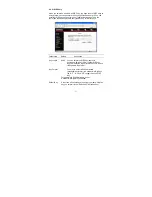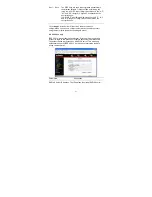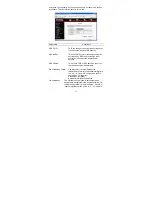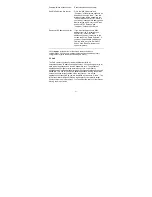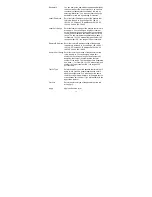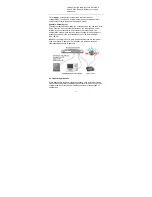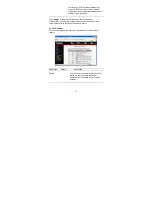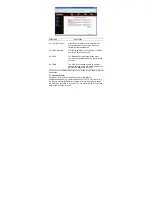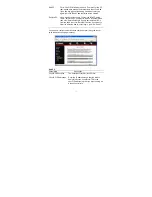
58
Bandwidth
You can assign the download or upload bandwidth by
the unit of Kbps (1024 bit per second). You can limit
the maximum bandwidth consumed by this rule by
selecting “Maximum”. You also can reserve enough
bandwidth for this rule by selecting “Guarantee”.
Local IP Address
Enter the local IP address range of the packets that
this rule will apply to. If you assign 192.168.2.3 –
192.168.2.5, it means 3 IP addresses: 192.168.2.3,
192.168.2.4 and 192.168.2.5
Local Port Range
Enter the local port range of the packets that this rule
will apply to. You can assign a single port number
here or assign a range of port numbers by assigning
the first port number and the last port number of the
range. The two numbers are separated by a dash “-“,
for example “101-150” means from port number 100
to port number 150 – the range of 50 port numbers.
Remote IP Address Enter the remote IP address range of the packets
that this rule will apply to. If you assign 192.168.2.3 –
192.168.2.5, it means 3 IP addresses: 192.168.2.3,
192.168.2.4 and 192.168.2.5
Remote Port Range Enter the remote port range of the packets that this
rule will apply to. You can assign a single port
number here or assign a range of port numbers by
assigning the first port number and the last port
number of the range. The two numbers are separated
by a dash “-“, for example “101-150” means from port
number 100 to port number 150 – the range of 50
port numbers.
Traffic Type
Select the traffic type of the packets that this rule will
apply to. We list some popular applications here to
ease the configuration. You also can get the same
result by using other parameters, for example source
or destination port number, if you are familiar with the
application protocol.
Protocol
Select the protocol type of the packets that this rule
will apply to.
Apply
Apply and exit the form.






